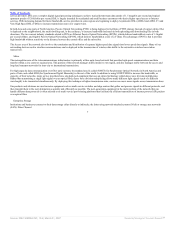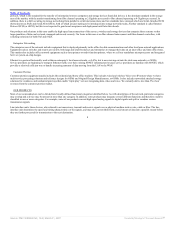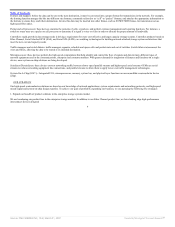Adaptec 2006 Annual Report Download - page 17
Download and view the complete annual report
Please find page 17 of the 2006 Adaptec annual report below. You can navigate through the pages in the report by either clicking on the pages listed below, or by using the keyword search tool below to find specific information within the annual report.
Table of Contents
including Freescale, Infineon, Integrated Device Technology, Maxim Integrated Products, and Texas Instruments. Some of these companies are concentrating an
increasing amount of their substantial financial and other resources on the markets in which we participate.
Over the next few years, it is possible for additional competitors to enter the market with new products, some of which may also have greater financial and other
resources than us.
We are also continuing to expand into certain markets, such as storage and wireless infrastructure, that have established incumbents with substantial financial and
other resources. Some of these incumbents derive a majority of their earnings from these markets. We expect continued strong competition in these markets.
LICENSES, PATENTS AND TRADEMARKS
We rely in part on patents to protect our intellectual property and have been awarded 208 U.S. and 65 foreign patents for circuit designs and other innovations
used in the design and architecture of our products. In addition, we have 84 patent applications pending in the U.S. Patent and Trademark office. Our patents
typically expire 20 years from the patent application date, with our existing patents expiring between 2010 and 2026.
We do not consider our business to be materially dependent upon any one patent. We believe that a strong portfolio of patents combined with other factors such
as our ability to innovate, technological expertise and the experience of our personnel are important to compete effectively in our industry. Our patent portfolio
also provides the flexibility to negotiate or cross license intellectual property with other semiconductor companies to broaden the features in our products.
To protect our other intellectual property we rely on mask work protection, trademarks, copyrights, trade secret laws, employee and third-party nondisclosure
agreements, and licensing arrangements.
Our only material license is the MIPS microprocessor architecture license from MIPS Technologies Inc., on which our microprocessor-based products are based.
While the desktop computer microprocessor market is dominated by the Intel Corporation’s “x86” complex instruction set computing, or CISC architecture,
several competing microprocessor architectures have emerged for other microprocessor markets such as the embedded computing market. Because of their
higher performance and smaller space requirements, most of the competing architectures, such as the MIPS architecture, utilize reduced instruction set
computing, or RISC architectures. The MIPS architecture is widely supported through semiconductor design software, operating systems and companion
integrated circuits. Because this license supports the architecture behind our microprocessors, we must retain the MIPS license in order to produce our next
generation microprocessor products. However, this license may be terminated only if we do not make the required royalty payments or breach confidentiality
obligations.
PMC, PMCS, PMC-Sierra and our logo are our registered trademarks and service marks. We own other trademarks and service marks not appearing in this
Annual Report. Any other trademarks used in this Annual Report are owned by other entities.
15
Source: PMC SIERRA INC, 10-K, March 01, 2007 Powered by Morningstar® Document Research℠
























